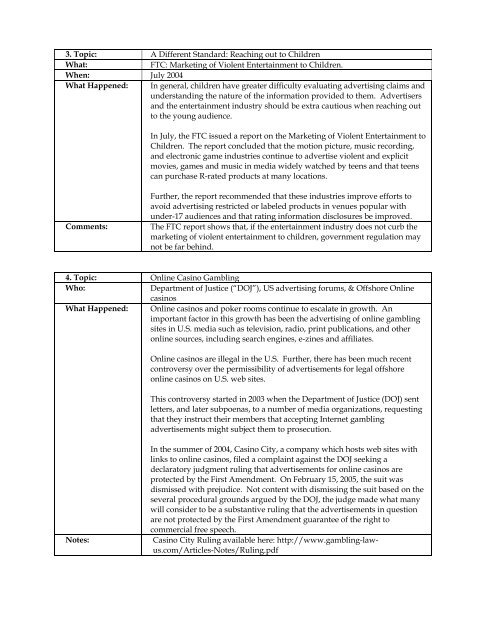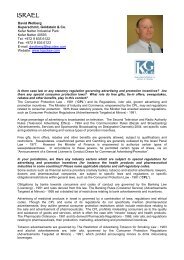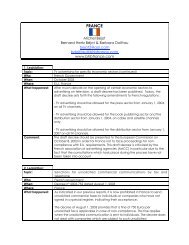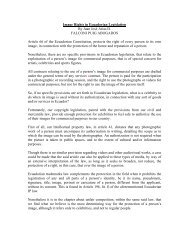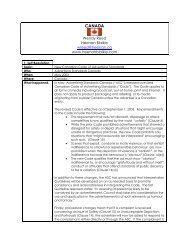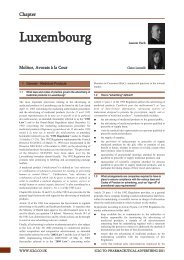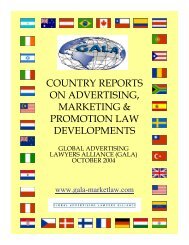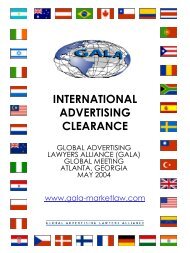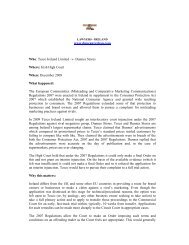list of contributors - GALA
list of contributors - GALA
list of contributors - GALA
You also want an ePaper? Increase the reach of your titles
YUMPU automatically turns print PDFs into web optimized ePapers that Google loves.
3. Topic: A Different Standard: Reaching out to Children<br />
What: FTC: Marketing <strong>of</strong> Violent Entertainment to Children.<br />
When: July 2004<br />
What Happened: In general, children have greater difficulty evaluating advertising claims and<br />
understanding the nature <strong>of</strong> the information provided to them. Advertisers<br />
and the entertainment industry should be extra cautious when reaching out<br />
to the young audience.<br />
In July, the FTC issued a report on the Marketing <strong>of</strong> Violent Entertainment to<br />
Children. The report concluded that the motion picture, music recording,<br />
and electronic game industries continue to advertise violent and explicit<br />
movies, games and music in media widely watched by teens and that teens<br />
can purchase R-rated products at many locations.<br />
Further, the report recommended that these industries improve efforts to<br />
avoid advertising restricted or labeled products in venues popular with<br />
under-17 audiences and that rating information disclosures be improved.<br />
Comments: The FTC report shows that, if the entertainment industry does not curb the<br />
marketing <strong>of</strong> violent entertainment to children, government regulation may<br />
not be far behind.<br />
4. Topic: Online Casino Gambling<br />
Who: Department <strong>of</strong> Justice (“DOJ”), US advertising forums, & Offshore Online<br />
casinos<br />
What Happened: Online casinos and poker rooms continue to escalate in growth. An<br />
important factor in this growth has been the advertising <strong>of</strong> online gambling<br />
sites in U.S. media such as television, radio, print publications, and other<br />
online sources, including search engines, e-zines and affiliates.<br />
Online casinos are illegal in the U.S. Further, there has been much recent<br />
controversy over the permissibility <strong>of</strong> advertisements for legal <strong>of</strong>fshore<br />
online casinos on U.S. web sites.<br />
This controversy started in 2003 when the Department <strong>of</strong> Justice (DOJ) sent<br />
letters, and later subpoenas, to a number <strong>of</strong> media organizations, requesting<br />
that they instruct their members that accepting Internet gambling<br />
advertisements might subject them to prosecution.<br />
In the summer <strong>of</strong> 2004, Casino City, a company which hosts web sites with<br />
links to online casinos, filed a complaint against the DOJ seeking a<br />
declaratory judgment ruling that advertisements for online casinos are<br />
protected by the First Amendment. On February 15, 2005, the suit was<br />
dismissed with prejudice. Not content with dismissing the suit based on the<br />
several procedural grounds argued by the DOJ, the judge made what many<br />
will consider to be a substantive ruling that the advertisements in question<br />
are not protected by the First Amendment guarantee <strong>of</strong> the right to<br />
commercial free speech.<br />
Notes: Casino City Ruling available here: http://www.gambling-lawus.com/Articles-Notes/Ruling.pdf


